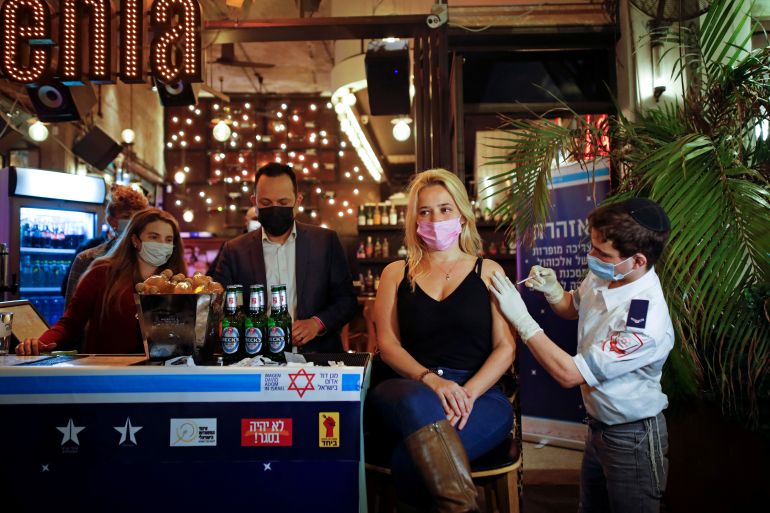Israeli study finds Pfizer vaccine 85% effective after first shot
Researchers say a longer follow-up is required to understand the effect of one shot to inform second dose delay policy.

A new study on healthcare workers in Israel has found that one shot of a two-dose vaccine produced by Pfizer-BioNTech is 85 percent effective, heightening the debate over the possibility of spacing out doses.
The Lancet medical journal published on Thursday the results of the study based on more than 9,000 health care workers from the Sheba Medical Center, an Israeli research hospital, showing a drop by 85 percent of staff presenting COVID-19 symptoms after a period of 15 to 28 days after the first dose.
Keep reading
list of 3 itemsPfizer withdraws emergency use bid of its COVID vaccine in India
South African COVID variant may reduce vaccine protection: Pfizer
The overall reduction of infections, including asymptomatic cases detected by testing, was 75 percent.
The reductions of infections “provide support of delaying the second dose in countries facing vaccine shortages and scarce resources, so as to allow higher population coverage with a single dose,” read the report.
However, it added that a longer follow-up is required to assess the long-term effect of a single shot to “inform a second dose delay policy”.
Sheba epidemiologist Gili Regev-Yochay cautioned that the cohort studied at the hospital was “mostly young and healthy”.
Unlike Pfizer-BioNTech’s own clinical trial, “we don’t have many (staff) here aged over 65,” she told reporters. But she also noted that the Sheba study took place during a surge in COVID-19 infections in Israel, which flooded hospitals with new cases.
Pfizer declined to comment on the data, saying in a statement it was doing its own analysis of “the vaccine’s real-world effectiveness in several locations worldwide, including Israel”.
Pfizer said it hopes to use Israeli data to look at the potential of the vaccine to protect against COVID-19 arising from emerging variants. Israel has become a real-world test laboratory since it has signed an agreement with Pfizer, promising to share vast troves of medical data with the international drug giant in exchange for the continued flow of its vaccine.
The Israeli study comes a day after Canadian researchers suggested that the second Pfizer-BioNTech dose be delayed given the high level of protection from the first shot in order to increase the number of people getting vaccinated.
Their research showed efficacy of 92.6 percent after the first dose, based on an analysis of the documents submitted by the drugmaker from its late-stage human trials to the United States Food and Drug Administration (FDA) in December.
The results from the Sheba Medical Center add to another laboratory study in Israel at the Rambam Health Care Campus where 91 percent of 1,800 health workers reportedly developed antibodies 21 days after receiving the first dose and before getting the second one.
The FDA said in December data from those trials showed that the vaccine began conferring some protection to recipients before they received the second shot, but more data would be needed to assess the potential of a single-dose shot.
Pfizer has said alternative dosing regimens of the vaccine have not been evaluated yet and that the decision resided with health authorities.